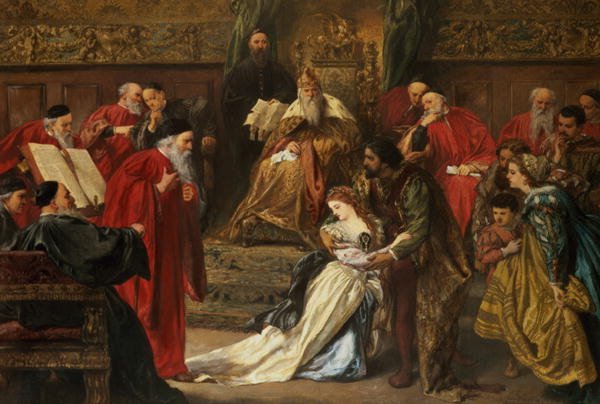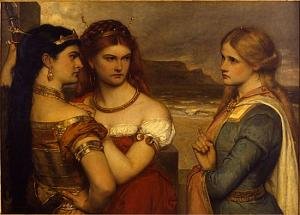King Lear and the Failed Man
Hey Steemians! I'm still new here but I'd love to share my love for literature with you. Shakespeare is one of the greatest as well as one of my favourite writers. He was incredibly perceptive and illuminated the deepest parts of human nature. Understanding the way he brings the depths to light is a mechanism in which we can do the same thing in our lives. King Lear is one of my favourite plays, so I wrote an essay about it. Enjoy!

Source
Shakespeare’s King Lear is a play that challenges the traditional worldviews of gender. In the play, the imaginary borderlines that separate masculinity and femininity are erased and the characters bleed through the binary. On one hand, the main female characters, Goneril, Regan and Cordelia, shun their feminine weakness and attempt to put themselves in a position of masculine authority. They often do this by displacing their femininity onto their male counterparts. In contrast their male consorts are emasculated and suffer greatly. The characteristics of traditional femininity include an appeal to emotion rather than a calm rationality, a gentleness in nature and a passive acceptance in the events of their lives. The traditional masculine characteristics are rationality, ambition and a compulsion to display authority. All of these traditional characteristics get reversed. Certain characters display a stronger reversal while others may displace these characteristics on a smaller scale.
The play begins with a reversal of tradition. Lear desires to retire from being king and as a result he divides his kingdom among his three daughters. In ancient societies (such as the ancient Britain in King Lear) there was a hereditary lineage of kings. There would be a hope for the birth of sons and a genuine disappointment in the arrival of daughters. Lear was forced to break away from the traditional power structure because all of his children were daughters. His only option is to pass his kingdom down to them. Shakespeare does not state that Lear approves of this or not. It just seems the natural thing for him to do, which is in and of itself a reversal of tradition. The only requirement is that his daughters poetically profess their love for Lear.

Source
This profession of emotion is a feminine characteristic. The irony in this particular case is that the two daughters, Goneril and Regan, who so beautifully expound their love do not feel it at all. Instead they are driven by a traditionally masculine force: ambition. The sisters make an appeal to authority and emotion. Goneril says: “Sir, I love you more than word can wield the matter; / Dearer than eyesight, space, and liberty.” (1.1.55-56) and Regan says: “…I profess / Myself an enemy to all other joys / … And find I am alone felicitate / In your dear highness’ love” (1.1.72-76). The first quote by Goneril appeals to authority by referring to her father as “Sir” and then she slips into a poetic speech about how words cannot describe her love for him. The second quote appeals to Lear’s authority by saying “your dear highness’ love” and she professes an inability to enjoy anything other than her father’s love. At first glance, Goneril and Regan seem to be reinforcing patriarchal power by submitting to their father’s demands but they are under the foggy guise of submissive femininity in order to fulfill their ambition. This performative act contents Lear and makes him feel secure. His fear arises when the established order gets shaken by Cordelia.
When Cordelia is called forth to profess her love she is unable to. Unlike her sisters she does not have any greedy ambitions. Instead she is simply being honest and sincere. She does hold the stereotypical feminine trait of bearing love and emotion but she uncharacteristically refuses to appeal to it. Cordelia readily admits that she does not love her father like her sisters claim they do:
Why have my sisters husbands if they say
They love you all? Haply, when I shall wed,
That lord whose hand must take my plight shall carry
Half my love with him, half my care and duty.
Sure I shall never marry like my sisters,
[To love my father all.] (1.1.99-104)
While her love is genuine so is her rationality. She knows she cannot love her father with full intensity when some must be left for her husband. Her refusal to compromise subtly puts her in an authoritative position. Commitment to men and their authority is exactly what is expected of a woman, so by refusing to compromise she has taken control of her life.

Source
Lear proceeds to exercise his patriarchal power by disowning her: “Here I disclaim all my paternal care.” (1.1.114) and “So be my grave my peace as here I give / Her father’s heart from her!” (1.1.126-27). In his act of disowning her, he has liberated her from patriarchy. All she had to do was refuse feminine performativity. It can be argued on the other side that Cordelia was thrown into further bondage by being exiled but in a broader sense it was the compulsory feminine performance that acted as her bondage. The same is true for her sisters, although they liberated themselves in an inverse method. They only performed their femininity in order to mask their true ambitions. It can be argued that Cordelia moves from one patriarch to another because she marries the king of France. Although this is true she is given a vast amount of autonomy with him, controlling his entire army at one point, a job reserved for trained generals. Essentially, Cordelia’s ability and willingness to break from her performance of femininity provides her an opportunity to explore and display a fuller humanity
Cordelia’s refusal to take part in Lear’s ego-stroking is not the only example of her display of authority, rationality and calm. In act four scene three, Kent asks a Gentleman if Cordelia received his letter. The Gentleman says: “It seemed it she was a queen / Over her passion, who, most rebel-like, / Sought to be king o’er her” (4.3.13-15). There is a play on the ideas of queen and king here. Her attempt to resist her emotion is a masculine move but her difficulty over it makes her “a queen over her passion,” implying a feminine weakness. The emotions seeking “to be king o’er her” is an echo to masculine domination. Cordelia possesses a wonderful calm where her emotions were expressed with “Patience and sorrow” (4.3.16). Her ability to express emotion and to do it calmly is a testament to her maturity as she balances her masculine and feminine characteristics with tenderness and grace. Also, at this point in the play the French army is under her command. The commander of an army is traditionally a man, which is again a testament to Cordelia’s authority and rationality. So far it is the women who have broken out of their traditional feminine roles but they also force the men to break away from their masculine tendencies.

Source
The men in King Lear are generally under assault by their female counterparts and are often emasculated. For them, breaking their gender roles is not liberating, it is shameful. When Goneril imposes her authority on Lear to remove 50 of his knights he says:
Life and death, I am ashamed
That thou hast power to shake my manhood thus!
That these hot tears, which break from me perforce,
Should make thee worth them. Blasts and fogs upon
thee!
Th' untented woundings of a father's curse
Pierce every sense about thee! (1.4.293-97)
Lear is in utter turmoil that his masculinity is in danger. The last of his forces and the last of his authority has been severed and by his own daughter. His emotion shown by “these hot tears” and his lack of authority is traditionally feminine. For Lear, being a woman is the ultimate bondage. Breaking gender roles for males serves as the antithesis of what it did for the female characters. In another example of his femininity Lear says: “Hysterica passio, down, thou climbing sorrow; / Thy element's below.—Where is this daughter?” (2.4.56-57). Hysterica passio is the medical term for hysteria and the following line “Thy elements below” suggests that hysteria’s natural place is in the uterus. Lear compares his hysterical state to that of a woman’s, implying that he is emasculated and that women have no control over their emotions. A reclamation of manhood never happens for Lear. He never revives his authority and his rationality is all but broken excepting his guilt towards Cordelia. He simply becomes a victim to the freefall of his life. Once stripped of his masculinity he becomes little more than a shadow.

Source
Lear is not the only man to be emasculated. Albany suffers the same fate, coming from his wife Goneril. When Albany turns on his wife she realizes he is not her ally and proceeds to mock his masculinity: “I must change names at home, and give the distaff / Into my husbands hands” (4.2.17-18). A distaff is the sowing machine of the time, so she is implying a switch in roles where Albany becomes the housewife. This particular example holds significance because Goneril is speaking outright about the exchange of gender roles. For her, the role of the housewife is lowly and demeaning and she wants to pass it off. Albany does not literally take this role but he is metaphorically emasculated because of his weak nerve, making him something less than a man. Goneril insults Albany earlier in the play as well saying:
This milky gentleness and course of yours,
Though I condemn not, yet, under pardon,
You are much more at task for want of wisdom
Than praised for harmful mildness. (1.4.339-42)
She says this because of Albany’s hesitation to put Lear in his place about challenging Goneril’s authority. “Milky gentleness” refers to a woman’s ability to breastfeed and nurture a child. His “gentleness” is not a virtue as it makes him feminine and weak and in Goneril’s eyes this demeans him.
The characters in King Lear clearly prefer masculinity. The female characters seek it and perform in whichever way they can in order to embody it. The male characters fear the fall from masculine grace. Anything less than a man becomes disrespected and lowly. This much is clear but what are the implications of this gender reversal? Shakespeare is not so obvious on this issue. Lear’s kingdom immediately begins its downfall in the hands of his daughters. This can mean that women are unable to lead or that overbearing masculinity is dangerous. Goneril and Regan perform masculinity to the extreme, sweeping away all fragments of femininity. A reversal this extreme led to their destruction. Lear’s utter emasculation led to his madness and downfall. Cordelia may well be the most well balanced character in the play but her demise happens as well. This confusion is not an accident, Shakespeare is experimenting with the established order of gender. He displays that there must be something outside of these performative roles that may lead to prosperity rather than tragedy. King Lear just happens to be an example of a failed experiment.
@nemsimicho You have received a 100% upvote from @intro.bot because this post did not use any bidbots and you have not used bidbots in the last 30 days!
Upvoting this comment will help keep this service running.
Hello @nemsimicho! This is a friendly reminder that you have 3000 Partiko Points unclaimed in your Partiko account!
Partiko is a fast and beautiful mobile app for Steem, and it’s the most popular Steem mobile app out there! Download Partiko using the link below and login using SteemConnect to claim your 3000 Partiko points! You can easily convert them into Steem token!
https://partiko.app/referral/partiko
Congratulations @nemsimicho! You received a personal award!
You can view your badges on your Steem Board and compare to others on the Steem Ranking
Vote for @Steemitboard as a witness to get one more award and increased upvotes!